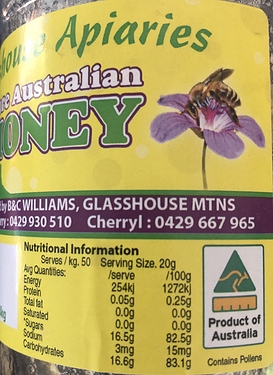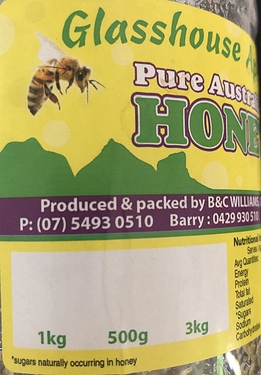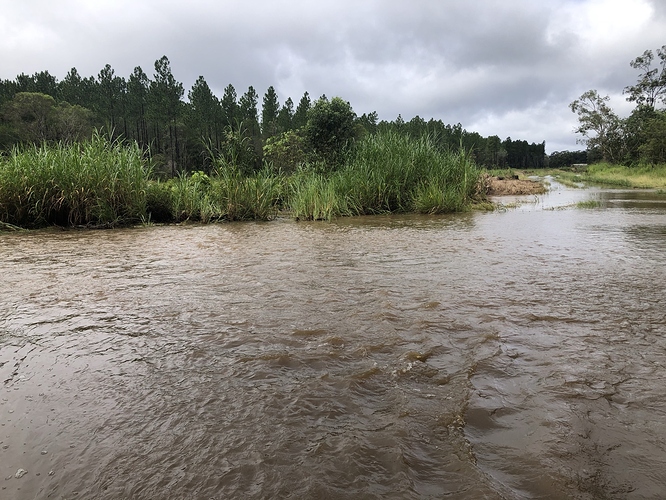As a hobby beekeeper I allow myself to give my 2-bob worth to this discussion. Any honey is good if it is labeled made from 100% ingredients i.e. it’s not watered down with sticky rice syrup mainly from China. The honey is even better if it is labelled unprocessed and not heat treated as in this case. Good honey also shows from which region it comes so you can guess yourself where the bees got their nectar from. If the beekeeper is out to produce a certain type of honey they may state e.g. Jarrah, Redgum, Manuka (Leptospermum) etc. My bees have been in the same place since 1996 and every season, every year the honey tastes slightly different. If you buy raw or unprocessed honey you are assured that it is unaltered and it’s up to your tastebuds which honey you prefer.
I live in WA, far away from Coonowrin but I can’t see anything wrong with the Coonowrin Honey labelling although ‘Mango Blossom’ may possibly be a bit far fetched.
I think so too and may not be one of their honeys from the pristine forests in Beerwah (likewise for apple and orange blossom honey). It could be from hives placed in a mango orchard (in Beerwah region or elsewhere) and while may be mostly honey from mango blossom, it will contain honey from other blossoms in and about the orchard - bees can’t be trained to only get honey from one particular flower type. But generally, it could be predominantly honey from mango blossoms - and mango blossoms gives the honey it’s dominant flavour.
In relation to flavour, Coonowrin Honey, they state…
Mango Blossom Honey reveals flavours of smoked butter, black cherries and high notes of passion fruit and toffee
Other mango blossom honey producers (Hawaii and Jamaica seems to have producers) state “Mango Blossom Honey captures the sweet essence of mango fruit in a honey that is as unique as it is delicious”. It appears some other producers may have a similar view to that of Coonowrin Honey in relation to the description of natural mango blossom honey flavour.
Lodging complaints or making allegations based on speculation can tarnish reputations of a business, especially this one which looks like it caters for tourists and would be suffering because if Covid restrictions.
While we can all speculate, it is reasonable for @davcor43 to contact Coonowrin Honey to clarify his concerns and set any misunderstanding straight. This is easy to do and doesn’t cost much except for a phone call and/or little time and effort.
Hello phb, I have already emailed this company (email did NOT jump back) and they have not answered. Hence, thinking Choice Community might be able to help. Did not start out to get them “into trouble” just wanted to make sure they were doing the right thing and stating correctly what was in the honey & where it is sourced from.
Try calling, their number of 0411 221 291
You seemed to jump to the conclusion that they had added flavours to their honeys. This assumption or allegation may not be correct when other producers state ‘Mango Blossom Honey captures the sweet essence of mango fruit in a honey that is as unique as it is delicious’.
As there have been allegations made about the Australian honey industry (some which have led to legal action between parties), I suspect any allegation against any honey producer will be taken seriously and allegations shouldn’t be made based on speculation.
That @davcor43 was told several different blossoms were involved some of which seem a bit far fetched for the location eg Apple Blossom and perhaps Orange blossom it seems right to question the makeup of the honey. Without successful contact and one would assume that email is a quite reasonable means and provides some proof of attempt, that the question of authenticity may arise and lead to some suspicion.
In my opinion as success in response to contact was allegedly not forthcoming then contact with those responsible for compliance is acceptable regardless of sensitivity around a particular industry.
Hopefully @davcor43’s Junk email folder has been checked just in case.
Coonowrin sell (from internet searches since their website is down)
Mango Blossom Honey
Apple Blossom Honey
Orange Blossom Honey
and potentially others. There are a number of other honey producers who market similar honeys. Each if these honeys will taste different if the predominant blossom is that labelled.
These honeys won’t be 100% the single blossom honey, but taste/undertones will be dominated by the blossom in question (noting this is no different to any other species specific honey sold anywhere).
The only inconsistency is the company byline about honey from the pristine Beerwah forests. This is like any company slogan and doesn’t represent all products sold…and is puffery. A good example is Woollies the fresh food people. Taking this literally means they don’t sell packaged or processed foods.
This is due to a opinion or belief that the honey must have additives due to its taste. This opinion or belief is unfounded speculation until proven otherwise.
As they were told something by the seller and it seems contradictory to the label they do have the right to be concerned.
Unfounded or? Perhaps based on what they were told by the seller which may be then termed misleading and so they queried the producer and received no reply so they do have a right to be concerned. I believe they then have a right for complaint to the authorities who will investigate hopefully and provide proof one way or the other. They are employing their rights to question.
Thank you for posting the additional pics of the labelling.
- ‘Coonowrin Honey’ in the example appears to be the business name.
- ‘Glass House Mountains’ should be describing the location from which the honey has been sourced.
- There is a PO Box for listed for Caboolture, 20km down the road. Incidentally not quite in the Glass House Mountains which is a compact area dominated by volcanic plugs. It’s not uncommon for commercial producers to have hives scattered around a wide area.
- There is a Mt Coonowrin and Coonowrin Creek in the Glass House Mountains region. The name is a simplified version of the ‘First Nations’ name for the mountain.
Hives are often moved in and out of adjacent districts to follow blossom. Using the names common to a well known district may just be clever marketing by association.
An alternate label from another ‘producer’ is less assertive in it’s claims. They fit comfortably on one label. The rest is left to the imagination.
Note the advice re pollens. Raw unfiltered honey will contain pollens, and other stuff. No claims of pristine forests. They know what all the locals know. It has been 99% cut for timber and mostly now cleared for other use. $12.50 retail in a 1kg plastic bottle.
Local ‘Beerburum East State Forest’ between Coonowrin and Coochin Creeks. Florida/Caribbean pine plantation, with overflow from Coonowrin in flood this year.
Good news, it has reappeared.
https://coonowrinhoney.com.au/
The claims for the product are open for our thoughts.
A number of honey flavours are noted as ‘infused’ and others qualified as ‘regional’. I’m curious as to the site where the Apple blossom and Australian Maple are found locally in sufficient quantity to be commercially viable. I’ve assumed the maple is the native Australian rainforest tree Queensland Maple, (Flindersia brayleyana). It’s a North Qld native and would need to have been introduced. It’s unrelated to the exotic Acer sp. (Maples) such as those well known in North America, Asia and Japan. Some further clarity required given the range of native blossom varieties listed.
The range and variety of honey varieties is most inspiring for an area of approx 70 sqkm.
A core product statement to note:
Coonowrin Honey is produced in the forests of the glasshouse mountains in Queensland. This region produces exceptional honey due to the wide arrange of plants for our bees to turn into honey. We our proud to bring you nothing but 100% pure and natural Australian honey.
Some may note some differences in the phrasing when compared with the previous discussion.
The three honeys outlined in the original post are from the blossoms of the varieties in question namely:.
Apple Blossom - ‘Our Apple Blossom Honey is derived primarily from the nectar of Fuji, Wolf River, Crispen, Sweet Sixteen, Pound Sweet, Granny Smith, Winesap, Fortune, Cortland, Empire, Ginger Gold, Macoun, Spigold, Honeycrisp, Jonagold, Golden Delicous, Acey Mac, and other apple blossoms. It is this wide variety of apple blossoms that gives our Apple Blossom Honey its unique and extraordinary flavor.’
Mango Blossom - “Mango Blossom Honey reveals flavours of smoked butter, black cherries and high notes of passion fruit and toffee to provide a truly sensational culinary experience.”
Orange Blossom - “Orange Blossom is produced from Australian Orange groves only. This honey has a very distinct flavour, a unique citrus after taste. This is a honey with a difference, but still completely natural.”.
This has answered the question posed about additives to these honeys - there are no additives. Where additives or flavouring has been to a honey base, they have been very clear in the information provided.
I cannot see how chilli honey is ‘natural’ unless the bees get the flavour from collecting something with chilli aroma/flavour from chilli plants. If that isn’t how the honey gets its flavour then it isn’t natural. To some people ‘natural’ is the most elastic word in the language as they make it mean anything they like.
It is an infused honey. Infused honeys are a honey based infused with a flavour. They have indicated this on their website.
Spice up your life with this Chilli infused honey! Chilli infused honeys are getting ever more popular, and this chili pepper honey certainly adds an extra kick to any meal. All our herbal infused honeys are made in-house with our own local honey.
Yes indeedy they do. They also say their products are “100% natural” without any disclaimer or exception for infused honey.
As well they say:
Check out our wide range of products made with pure, 100% Australian honey – NO added preservitives, NO added sugars & NO imported ingredients – Just pure honey, they way nature intended.
So it is very clear that they claim infused honey is pure and natural. Well it is neither. It may not have imported ingredients but it does have ingredients introduced by man not by bees, thus neither pure nor natural.
It seems you have a soft spot for the Australian honey industry, this being the second thread today where you have given them the benefit of the doubt way more than you would normally do for a food producer.
An infused honey can be 100% natural. There isn’t any issue with this statement.
There isn’t anything wrong with this this either. They use pure 100% Australian honey (puffery) and they don’t add preservatives, sugars or use imported ingredients.
They don’t say that all there products are 100% honey. This would land them in hot water.
I have no relationship with the Australian honey industry, I get tired of those who wish to smear a business or industry based on no evidence, but due to hearsay, innuendoes, rumours myths or unfounded allegations. If one has evidence that there is some issue with a product, then present it for all to see. If one choses to rely on hearsay, innuendoes, rumours myths or unfounded allegations, I suggest that they keep these to themselves so that they don’t become part of society out to discredit an industry with a high reputation and known worldwide for its high quality products.
I purchased a 1kg tub of what is labelled “100% pure honey”. Now as a honey lover, who has sampled 100’s of honeys all over the world, I can say with confidence, that tastes like there is more golden syrup in this tub, than anything else that resembles honey. A bit dissapointing!
Hi @Henk, welcome to the community.
Can you provide some further details such as the brand/producer and where it was purchased from.
Honey can vary considerably in colour, texture and taste. I’ve had some raw honey’s that are very dark and have an almost bitter after taste. I’ve been assured they were natural by several sources who should know. Perhaps some further details or a pack shot might assist us to better understand the product you have purchased.
Couldn’t agree more. Some speciality honey are very unique and vary enormously from what one would consider a ‘standard honey’.
We have a speciality honey store in northern Tasmania which has dozens of speciality honeys, from a range of different plant species.
We have tried many of them and some have a very light flavour through to unusual taste and aftertastes. Some also taste sweeter while others are runnier. Not knowing how honey varies enormously depending on what the bees find, one might otherwise think that the honeys have been adulterated.


